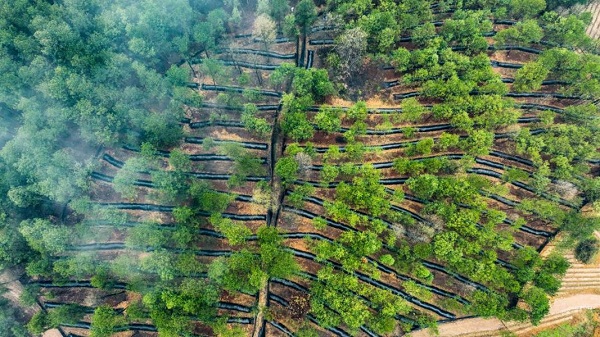Forestry derived economy booms in Guiyang

The forestry derived economy in Guiyang is increasing incomes for farmers. [Photo/Guiyang news network]
Guiyang, capital of Southwest China's Guizhou province, has utilized 1.36 million mu (90,680 hectares) of forest land for the forestry derived economy, according to the Guiyang bureau of forestry.
Encompassing forest mushrooms, medicinal herbs, forest vegetables, and beekeeping, the forestry derived economy has become an emerging industry for rural vitalization and prosperity.
Guiyang has fully utilized its forest resources and cultivated its forestry industry with an emphasis on underwood planting. State-owned forest farms and key villages and towns have been actively developing underwood planting, promoting direct planting by enterprises, cultivating plantations, and developing the "company + village collective economic organization (cooperative) + farmers" model to expand the scale of underwood planting bases.
As of June 2023, the city had completed 82,300 mu of underwood planting, including 10,600 mu of mushrooms, 20,200 mu of medicinal herbs, and 51,500 mu of forest vegetables.
The entire industrial chain of the forestry derived economy has achieved a total output value of 5.98 billion yuan ($835.3 million). It has created more than 2,000 jobs and increased incomes for about 17,500 people.
The per capita monthly income in Guiyang reached 1,913 yuan, highlighting the role of the forestry industry in increasing farmers' incomes.
In addition, efforts have been made to include understory planting in local agricultural insurance, and designated insurance institutions have been selected to carry out pilot projects for policy-based insurance coverage for red-topped bamboo mushrooms.
The financial sector has utilized policy-based credit loan risk compensation funds and developed customized credit loan products for forestry farmers. More than 24 million yuan in funding has been secured from higher-level authorities for the development of the forestry derived economy in 2023 so far.
Presented by China Daily.
黔ICP备05001922号
All Rights Reserved.
Presented by China Daily.
黔ICP备05001922号



